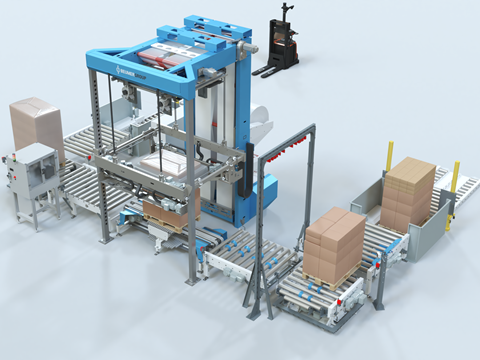
BEUMER Group will display its latest ‘maintenance-friendly’ stretch hood technology – compatible with films containing recycled content and targeting improved safety, efficiency, and ergonomic performance – at FACHPACK 2024.
As the German Packaging Act (VerpackG) and the EU’s Packaging and Packaging Waste Regulation come into force, pressure is increasing to drive up recycling rates and reduce the volume of waste; one method of doing so is to increase the recycled content in packaging film.
The BEUMER stretch hood A packaging machine is expected to help customers meet these legal requirements and improve the sustainability credentials of their packaging process. Reportedly, it can ‘safely and reliably’ process films containing 30% recycled material or higher; because it utilizes ‘thinner yet higher-performance’ types of film, the machine is thought to lower both film consumption and packaging costs.
Furthermore, it can be implemented as a two-film format machine. In this case, it calculates the optimum film requirement for each pallet and, without requiring the film rolls to be changed, only applies the amount of material necessary to the pallet format in question – a process said to unlock a lower CO2 footprint.
It is designed to encompass a variety of products, including food, beverages, high-quality electronics, and palletized building materials. According to the company, it ensures pallet stability and minimizes the risk of slippage, which keeps loads safe during transport and storage; additionally, it aims to protect goods against moisture, dirt, and tampering or theft.
An ergonomic human-machine interface, BEUMER HMI, is set to facilitate straightforward and intuitive operation. Operators will no longer require a ladder, platform, or lifting truck to performance maintenance and service work, BEUMER explains, as all components can be accessed from the ground or lowered to an accessible level.
The BEUMER Customer Diagnostic Centre is also designed to provide comprehensive data analytics, helping customers precisely monitor and optimize their packaging processes. Real-time performance data and advanced management tools are integrated to give customers a direct overview of their machinery’s operational status, as well as identify any improvements required.
A team of BEUMER Group experts is also on hand to provide a virtual “look over the shoulder” service using BEUMER Smart Glasses. In doing so, it can oversee the customer’s service personnel in an effort to troubleshoot efficiently.
“The BEUMER stretch hood A fulfils the highest standard in terms of loading safety and the protection of resources,” says Jörg Spiekermann, head of Sales for Palletising and Packaging Systems Consumer Goods at the BEUMER Group. “We continue to develop our systems and services, to help the transition to ‘lights-out’ operation.
“This means that physically strenuous work will be increasingly substituted by robots or automation processes, so that humans can concentrate on more productive or administrative tasks. This brings the dark warehouse within tangible reach.”
At FACHPACK 2024, the BEUMER Group will be available at Stand 7A-533. Visitors are invited to ‘exchange ideas with experts on all aspects of sustainability and innovative diagnostics systems and take inspiration from them.’
At the same event, Henkel will showcase its ‘anti-slip’ palletizing and end-of-life adhesives. Also seeking to comply with EU regulations, the solutions are set to provide such benefits as reducing stretch film usage by up to 90% and enabling automated depalletizing.
Another product wrapping development saw ValTara reveal its Breezy Wrapper; this solution brings together the horizontal flow wrapping and vertical bagging of trays and containers in one machine, automatically adjusting films to fit the length of a product.
If you liked this story, you might also enjoy:
How are the top brands progressing on packaging sustainability?
Sustainable Innovation Report 2024: Current trends and future priorities
Reuse vs. single use – which is better for the environment?
The ultimate guide to global plastic sustainability regulation














No comments yet